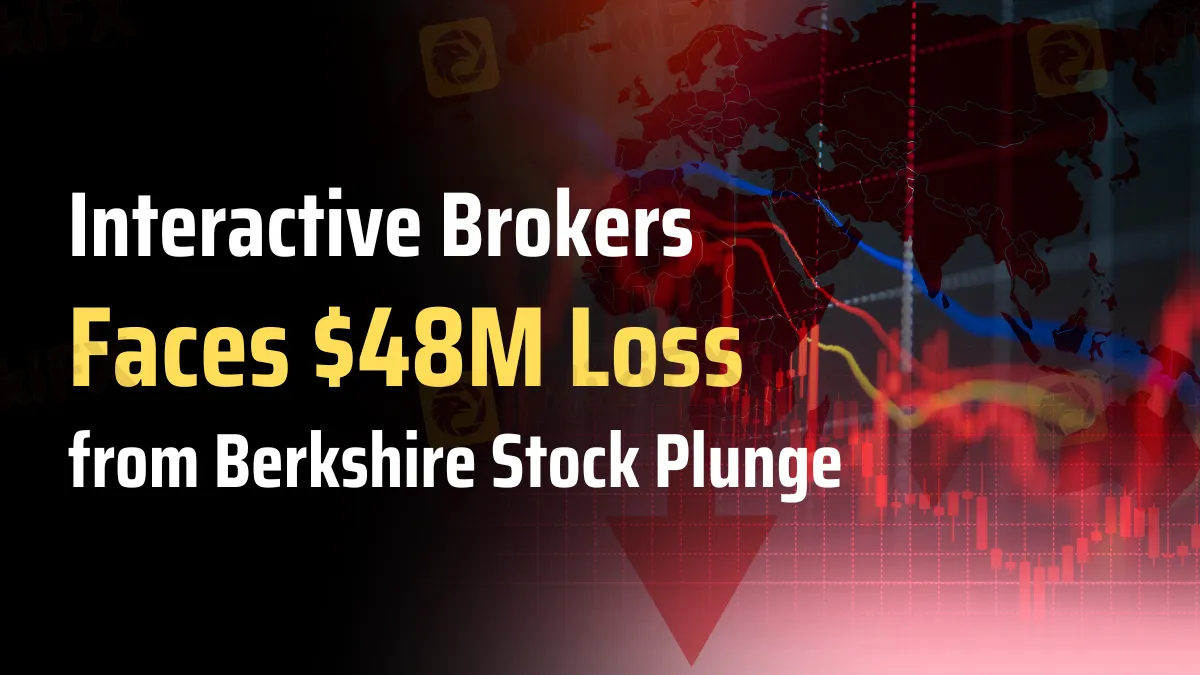简体中文
繁體中文
English
Pусский
日本語
ภาษาไทย
Tiếng Việt
Bahasa Indonesia
Español
हिन्दी
Filippiiniläinen
Français
Deutsch
Português
Türkçe
한국어
العربية
Interactive Brokers Faces $48M Loss from Berkshire Stock Plunge
Abstract:Interactive Brokers reports a $48M loss due to NYSE's rejection of error petitions after Berkshire Hathaway's stock price plummeted. Recovery options are being considered.

On June 3, 2024, Interactive Brokers (NASDAQ: IBKR) reported a substantial financial effect as the price of Berkshire Hathaway Class A shares dropped precipitously. The business reported that it suffered around $48 million in damages as a result of a technical failure at the New York Stock Exchange (NYSE), which caused the stock price to plummet from around $622,000 to an amazing $185 per share.
The event occurred about 9:50 a.m. EDT when the price of Berkshire Hathaway's Class A stock fell in seconds. This precipitous decline, which was ascribed to an undisclosed technical fault at the NYSE, resulted in an immediate suspension of stock trading. Following the suspension, customers of Interactive Brokers' numerous subsidiaries spotted a brief opportunity and submitted market purchase orders at significantly discounted prices, expecting a huge deal once trading restarted.
However, the NYSE restarted trading without correcting the significant order imbalance that had developed during the pause. When trading resumed at around 11:35:54 a.m. EDT, the share price skyrocketed to $648,000, then to $741,971.39 within 98 seconds. This quick growth led to multiple Interactive Brokers customers' orders being completed at these exceptionally high prices, with some transactions reaching the top price.

Recognizing the chaotic nature of these deals, Interactive Brokers quickly filed an erroneous execution (CEE) petition with the NYSE and other US exchanges, attempting to cancel the transactions completed at these aberrant prices. Unfortunately, the NYSE took several hours to react, and the business learned that their petition had been denied after normal trading hours had ended.
That evening, Interactive Brokers decided to take up a significant chunk of these deals to better serve its clients. The business also filed compensation claims with the NYSE, but these were refused on June 25, 2024. This rejection verified the company's realization of nearly $48 million in damages, which included losses on some hedging agreements.
Despite the major financial setback, Interactive Brokers has claimed that the losses are unlikely to have a meaningful impact on its financial situation. The business is currently investigating possibilities for recovering these funds, which may include initiating legal action against NYSE or associated organizations.
The fast and upfront notification by Interactive Brokers about the issue shows the intricacies and hazards involved in electronic trading, as well as the possible consequences of technological breakdowns at large exchanges. The company's proactive approach to handling the repercussions and pursuing reparation demonstrates its dedication to its customers and financial stability.
As Interactive Brokers considers its next actions, the rest of the market keeps a careful eye on the situation.

Disclaimer:
The views in this article only represent the author's personal views, and do not constitute investment advice on this platform. This platform does not guarantee the accuracy, completeness and timeliness of the information in the article, and will not be liable for any loss caused by the use of or reliance on the information in the article.
Read more

Why is there so much exposure against PrimeX Capital?
In recent months, PrimeX Capital, a Forex and CFD broker established in 2022, has become a subject of concern in the trading community. However, despite these enticing features, the broker's reputation has been severely tarnished by multiple complaints and a troubling lack of regulatory oversight.

The Hidden Checklist: Five Unconventional Steps to Vet Your Broker
Forex broker scams continue to evolve, employing new tactics to appear credible and mislead unsuspecting traders. Identifying these fraudulent schemes requires vigilance and strategies beyond the usual advice. Here are five effective methods to help traders assess the legitimacy of a forex broker and avoid potential pitfalls.

Doo Financial Obtains Licenses in BVI and Cayman Islands
Doo Financial, a subsidiary of Singapore-based Doo Group, has expanded its regulatory footprint by securing new offshore licenses from the British Virgin Islands Financial Services Commission (BVI FSC) and the Cayman Islands Monetary Authority (CIMA).

WikiFX Review: Is FxPro Reliable?
Founded in 2006, FxPro is a reputable UK-based broker, trading on various market instruments. In this article, we will help you find the answer to one question: Is FxPro reliable?
WikiFX Broker
Latest News
AIMS Broker Review
The Hidden Checklist: Five Unconventional Steps to Vet Your Broker
Russia to Fully Ban Crypto Mining in 10 Regions Starting January 1, 2025
YAMARKETS' Jingle Bells Christmas Offer!
Why is there so much exposure against PrimeX Capital?
MTrading’s 2025 "Welcome Bonus" is Here
Doo Financial Obtains Licenses in BVI and Cayman Islands
CFI’s New Initiative Aims to Promote Transparency in Trading
Currency Calculator


